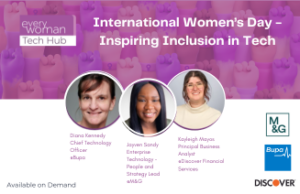
Alongside her role as Executive PA to the General Manager of Lenovo South Africa, Jane Govindsamy leads the company’s ROBO Girl initiative, a free-to-access project designed to encourage coding and Robotics in government schools for young women. Piloting in December 2022, its success was immediate and Jane is now planning a new intake. We talked to her about how access to skills and tech environments can widen the understandings of possibility for South African communities, and why young girls in particular need to be enabled and encouraged to see themselves in the industry of the future.
How did you get involved with the ROBO Girl initiative?
When I joined Lenovo in 2018 as a PA to the General Manager of southern Africa, I was handed a file with just three duties in it as a job spec. I said to myself, this will not work for me. I knew this was no challenge and I wanted to achieve more. So, I canvased for the position of BEE (Black Economic Empowerment) Administrator, working hard alongside my day job to gain a full understanding of the laws, rules and compliance around BEE legislation, which is a requirement in South Africa. I now run all BEE-related audits, compliance and projects independently and this branches out into the CSI projects that Lenovo SA undertakes, which I’m also now responsible for. Lenovo runs a global month of service every year – inviting employees around the world to make a positive impact in their communities, in alignment with Lenovo Foundation’s mission to empower underrepresented populations with access to technology and STEM education. I offered to run this for our office this year and ROBO Girl was part of it. All schools in South Africa will be offering coding as part of the curriculum from next year and I started a conversation with the Durban University of Technology about running a project around Robotics and coding for girls. We were supposed to partner with the Department of Education and Vodacom on this, but in September I was told they weren’t going to be able to partner this year. Since I’d put my mind to it and wanted to do something for these girls I asked if we could just continue with the idea so, we put a plan together for a small pilot project. The aim was to upskill young girls and teach them the techniques of coding. We sent out a proposal to the principals and IT teachers of 15 government schools to ask if they would be interested in taking part.
Why do girls in particular need the awareness and opportunities of projects such as ROBO Girl?
There are so few girls in tech at present and we are trying to empower and mentor more of them to show them how great the industry is, because it’s so important that we increase the diversity in the sector. If you look at it from a cultural perspective as well, we don’t have a lot of women from disadvantaged areas who are able to get more involved in this area because they don’t have the funding to get training or go to university. In assisting and training these young women. Lenovo gives them that flexibility and if we can see that students are interested and have good results, we can also sponsor them with bursaries if they want to go into the tech world. We had so many different girls joining ROBO Girl this year, and when we spoke to them, they said they never expected this level of interest. If we do not share the knowledge or get these girls to come into this kind of environment, they’re not going to know what it’s all about. So, it’s all about the awareness that we are bringing out into these communities.
How is the ROBO Girl project structured?
The girls are asked to perform and build a project around the task given to them and the project theme this year was ‘saving the soil’. The training was three days, with two days to build their projects and then on the sixth day, the girls had to speak about their projects and explain what they had done and how they got there. Our five judges were from Lenovo and the university, and the eventual winner was the team from St Monica’s, a home for abandoned young woman in Durban. This meant so much to me as I first started with the Lenovo Foundation by doing hygiene training and a sanitary drive for them. The first prize was five laptops, and we also gave them Robotics kits so they could go home and experiment for themselves with what they’d learned. The winners will also have their own company registered too and in time I’d love it if we could help ROBO Girl entrants to become entrepreneurs themselves.
Alongside technical skills, what do young women need to have a successful tech career?
Helping young girls to become aware of their abilities, that they are important and that if they put their mind to doing something it can be done is key. And we do this by showing them or giving him good advice. I use myself as an example as well, coming from a poor background I moved forward because I wanted to make a difference. I set goals for myself back then, and that’s what I tell the girls as well — to set goals. We want these young girls to be future leaders — not only in the tech world, but in whichever career path that they choose. Being independent is so important as well, so that you don’t have to rely on anybody. Also, working on your self-belief is to be part of a much wider solution around raising women up and creating a more equal society. It starts with you though, and you need to have a positive mindset. If you’re going to have any negativity it’s always going to hold you back in your career.
Are there any other challenges to a tech career for girls that you address with this project?
With every project we do, we ensure that we give each girl a hygiene pack of sanitary pads, lotion and roll-on deodorant. Hygiene is so important; but we have so many girls that cannot even afford to buy sanitary pads and so many out there that do not go to school when it’s that time of the month. Tackling this is part of the bigger picture — the young women need skills and to be able to go to school, and to do that they need to be able to feel confident about themselves.
How do you combine your ROBO Girl work with your daily role?
I’m very good at planning and I often work late too because I need to have calls with teachers for example, and you can only do it after they have finished school. You must be passionate about what you’re doing and give your time to do something like this. It’s also important that you communicate to the organisation you work for and give regular updates. Lenovo has been very understanding and I have regular meetings with the management team to let them know what is happening with the projects and give them step-by-step breakdowns. Running a project like this alongside your role is not something that you want to do because you were ‘told’ to do it. You have to give all that you have. But the main thing is to know that you can make a real difference, and just putting a smile on a young girl’s face brings you joy — we cry, we laugh, it does sometimes get very emotional!
What are your aims for ROBO Girl now?
The tech industry in southern Africa is really expanding now, there are so many tech companies out there. So, it’s about making sure that the girls don’t get left behind in skills training, particularly those from disadvantaged backgrounds. That’s where we fit into providing smarter technology training and STEM education. For the girls, it is about the excitement, the knowledge they’ve gained and how they worked, and to see the joy in the faces after they’ve built a project ‑ to say ‘look what we have done’. Next year I want to get double the number of girls involved and for the winners to compete at international level.
What would your advice be to anyone that wants to contribute socially alongside their role?
We all have day jobs, and it’s not easy to juggle our duties but giving your time and helping to mentor these young girls to make decisions helps. You cannot say that you want to do it today, and then tomorrow you don’t have the time to though. If you commit yourself to do the work, you have to get it done. People need to be proactive and look for opportunities to help and get involved. It’s not easy, because you’re doing this alongside your daily job, so you have to juggle a bit. But really it isn’t that difficult, it’s just making a little bit of time. And that time really goes a long way.



